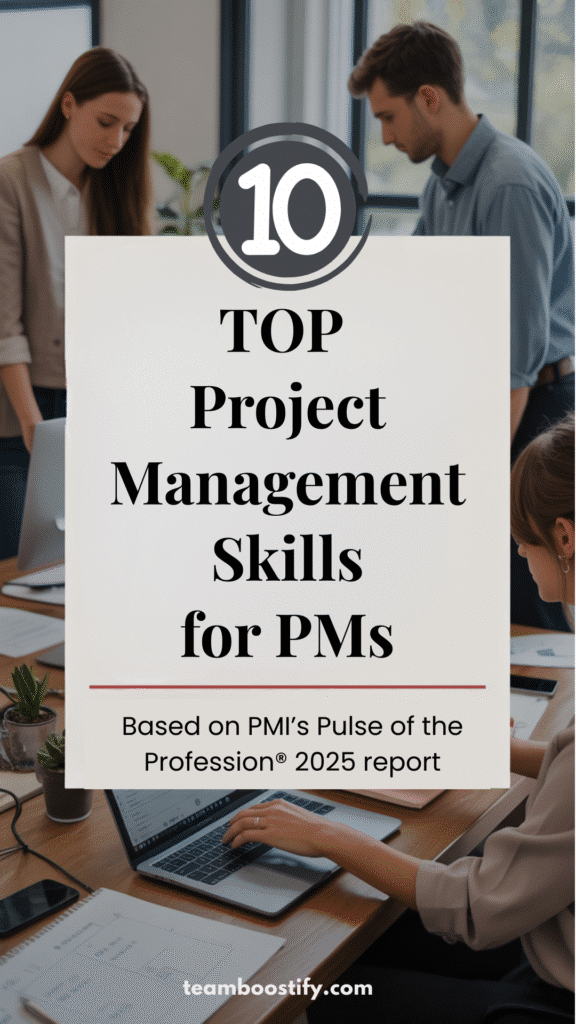This list of project management top skills is based on PMI’s Pulse of the Profession® 2025 report. The report includes insights from nearly 3,000 project professionals around the world.
You won’t see this exact list in the report, but if you read all 41 pages, these skills show up again and again – as part of what drives real project success today.
Some of these skills are core parts of business acumen itself. Others are closely linked – they help project managers apply business thinking in complex, fast-changing environments. Together, they form a practical skill set that sets top performers apart.
If the goal is to stay valuable, lead with confidence, and grow as a modern project manager, these are the skills to focus on.
P.S. If you also want to read the full original report, Pulse Report 2025: Boosting Business Acumen is available on the Project Management Institute website (Just log in or register for a free PMI account to download it).
Table of Contents
1. Project Management Top Skills: Stakeholder Management & Engagement
From the PMI report:
According to the Pulse of the Profession® 2025 report, stakeholder management is the top-rated skill when projects face challenges.
94% of professionals say it’s essential for handling schedule issues, 93% for scope, and 91% for budget.
It’s also one of the most commonly used tactics to deal with project roadblocks — applied by 82% of professionals in practice.
In addition, 77% of senior leaders name stakeholder management as one of the top three skills they look for when hiring project managers.
The report also notes that stakeholder engagement helps address cross-functional conflicts and align priorities.
Experts interviewed in the study highlight its role in preventing escalation, building trust with sponsors, and asking the right questions at the right time.
Why it matters:
Stakeholder engagement supports alignment, trust, and timely decision-making – all critical for project performance under pressure.
It helps maintain shared understanding across functions and reduces the risk of delays caused by miscommunication or conflicting expectations.
2. Project Management Top Skills: Financial Acumen
From the PMI report:
According to the Pulse of the Profession® 2025 report, financial acumen is one of the core business skills where project professionals show the biggest gap compared to senior leaders — only 55% of PMs rate themselves as proficient, versus 84% of senior leaders.
It is also part of the skill group with the highest variation in perceived importance, showing that many professionals still underestimate its value.
Case examples in the report show how financial understanding helps project professionals assess business impact, justify budget decisions, evaluate margins and ROI, and identify risks earlier to adjust plans.
Why it matters:
Financial awareness enables better decision-making in areas such as budgeting, risk assessment, and resource allocation.
It helps project teams connect day-to-day execution with business impact and supports communication with executive stakeholders.
3. Project Management Top Skills: Strategic Thinking
From the PMI report:
According to the Pulse of the Profession® 2025 report, strategic and organizational alignment is a core part of business acumen.
It includes understanding the organization’s goals and aligning project work accordingly.
These skills are clearly linked to higher project performance. At the same time, the report shows that project professionals vary in how they rate their importance — many still don’t fully recognize their value.
One featured PM explains how translating technical details into business language helped align the project with organizational goals and gain executive support.
Why it matters:
Strategic thinking helps align project goals with what matters most to the business.
It supports smarter decisions, stronger stakeholder buy-in, and long-term value creation.
4. Project Management Top Skills: Measuring Project Value
From the PMI report:
According to the Pulse of the Profession® 2025 report, project professionals with strong business acumen track more success factors than others — around nine on average, compared to just six.
They don’t stop at time, budget, and scope. They also look at things like customer satisfaction (83%), quality of work (78%), strategic alignment (65%), and long-term outcomes.
This broader approach reflects two key principles from the PMI MORE framework: expanding perspective and reassessing success factors throughout the project.
The report connects this mindset with strategic maturity and meaningful results. One featured expert notes that adding metrics like stakeholder satisfaction and societal impact led to stronger project outcomes.
Why it matters:
Measuring value across multiple dimensions helps show the real impact of the project — not just if it was delivered, but whether it was worth delivering.
It also improves transparency, decision-making, and communication with stakeholders at all levels.
5. Project Management Top Skills: Risk and Issue Mitigation
From the PMI report:
According to the Pulse of the Profession® 2025 report, 62% of project professionals say business acumen improves how they manage risks and respond to issues.
It is one of the top three benefits of strong business acumen, along with better decision-making and stakeholder alignment.
High-performing professionals apply specific mitigation tactics when challenges arise. The most common include:
– predicting and assessing risks early (82%)
– escalating issues to leadership (75%)
– reprioritizing and reallocating tasks (63%)
– involving executive sponsors (61%)
– resolving conflicts between priorities (56%)
– managing internal team conflicts (49%)
These actions help reduce project delays, support better decisions, and protect business outcomes.
Why it matters:
Risk mitigation is not just a reaction to problems.
It is a structured way to protect value, keep momentum, and maintain trust across teams and stakeholders — even in changing conditions.
6. Project Management Top Skills: Organizational Navigation
From the PMI report:
According to the Pulse of the Profession® 2025 report, understanding how the organization works is a key part of business acumen.
This includes navigating internal structures, aligning with decision-makers, and managing competing interests.
67% of project professionals rate themselves as proficient in this skill — compared to 80% of senior leaders, showing a clear gap.
The report also notes that early-career professionals often receive less support in this area and need to build their knowledge through informal learning and hands-on experience.
One of the most effective tactics is early engagement with sponsors and governance boards — used by 61% of high-performing professionals to identify blockers and reduce delays.
As Dr. Saadi Adra explains in the report, this approach allows project professionals to ask the right questions and prevent risks from escalating.
Why it matters:
Organizational navigation supports faster decisions, stronger alignment, and smoother execution — especially in cross-functional environments.
It also builds influence and trust, helping projects move forward even when priorities shift.
7. Project Management Top Skills: Industry Knowledge
From the PMI report:
According to the Pulse of the Profession® 2025 report, industry knowledge is part of the strategic skill set that supports stronger project performance.
Yet it remains one of the most underestimated capabilities — only 36% of senior leaders prioritize it when hiring, and just 55% of project professionals rate themselves as proficient, compared to 74% of senior leaders.
The report highlights that many professionals don’t fully recognize how industry knowledge connects project work to real business outcomes.
One expert notes that understanding market trends and client needs helps project managers identify ways to grow project value and adapt more effectively to change.
Despite its importance, half of professionals say they pursue this learning independently, as it’s not often supported by their organization.
Why it matters:
Industry knowledge helps teams understand what success looks like in context.
It supports smarter planning, more relevant outcomes, and stronger relationships with clients and stakeholders.
8. Project Management Top Skills: Team Capability Management
From the PMI report:
According to the Pulse of the Profession® 2025 report, managing the distribution of skills across the team is a critical part of business acumen — especially when projects face time or scope pressures.
82% of professionals say it’s very important when timelines are tight, and 76% when dealing with scope changes.
It is also a key risk mitigation tactic: 63% of high-performing professionals adjust task assignments and resource focus to reduce blockers and delays.
This skill supports better adaptability in fast-changing situations and helps teams maintain quality without overload.
As one expert notes in the report, strategically matching skills to tasks is one of the most effective ways to stay on track under pressure.
Why it matters:
Understanding team capabilities helps balance workload, avoid bottlenecks, and stay flexible when plans shift.
It ensures the right people are focused on the right work — especially when priorities change mid-project.
9. Project Management Top Skills: Scope & Budget Impact Awareness
From the PMI report:
According to the Pulse of the Profession® 2025 report, professionals with strong business acumen are better at understanding how scope and budget decisions affect overall project success.
When managing budget issues, 90% of respondents highlight scope management as essential, and 87% emphasize financial acumen.
Scope changes are closely tied to cost variance and cash flow — one expert explains that shifting scope may delay delivery or increase expenses, directly impacting the business.
The report also shows that early escalation (75%) and sponsor involvement (61%) are key tactics used to manage scope and budget risks.
This skill helps project professionals evaluate trade-offs, align with priorities, and avoid unintended consequences across the organization.
Why it matters:
Scope and budget decisions shape both delivery and business outcomes.
Awareness of their impact supports better trade-offs, reduces risk, and helps keep the project aligned with what the organization actually needs.
10. Project Management Top Skills: Adaptability to Change
From the PMI report:
According to the Pulse of the Profession® 2025 report, adaptability is a key part of business acumen.
It’s reflected in the ability to reassess project goals, metrics, and priorities throughout the life cycle — one of the core principles of the MORE framework.
High-performing professionals adjust to change by expanding how they measure success, reviewing risks continuously, and staying aligned with shifting business needs.
Experts in the report explain how this mindset supports long-term value, especially when working across different projects or industries with evolving expectations.
Why it matters:
Adaptability supports resilience and relevance.
It allows teams to adjust with purpose — not just react — and helps maintain direction when conditions change around the project.
FAQ
What is business acumen in project management?
It’s the ability to understand how a project fits into the bigger picture of the business. It includes financial knowledge, strategic thinking, and working effectively with stakeholders. Business acumen helps project managers make decisions that support real outcomes — not just delivery.
Is business acumen a soft skill or a technical skill?
It’s neither. Business acumen is one of the three pillars of the PMI Talent Triangle®, along with Ways of Working (technical skills) and Power Skills (like communication and leadership). It’s a strategic skill — it connects project execution with business outcomes and long-term impact.
Why does business acumen matter for project managers now?
Because organizations expect more than just on-time delivery. They want results that support business goals. Business acumen helps project managers speak the language of leadership, stay relevant, and show the real value of their work.
This post breaks down ten project management top skills that stand out in the Pulse of the Profession® 2025 report.
Some of them are core parts of business acumen. Others help apply it – especially when things shift, speed up, or go sideways.
Together, they form a practical skill set that helps project managers stay valuable and lead with clarity in real business contexts.
Check out other articles on the blog about project leadership, facilitation, and project management:
→ 10 Key Meeting Facilitation Skills to Boost Team Performance
→ 55 Inspiring Being a Good Leader Quotes for Project Managers
→ 15 Practical Work From Home Productivity Criteria for PM
Also on Pinterest: @Julia_PM_Facilitator – with ideas for real-world project work.



